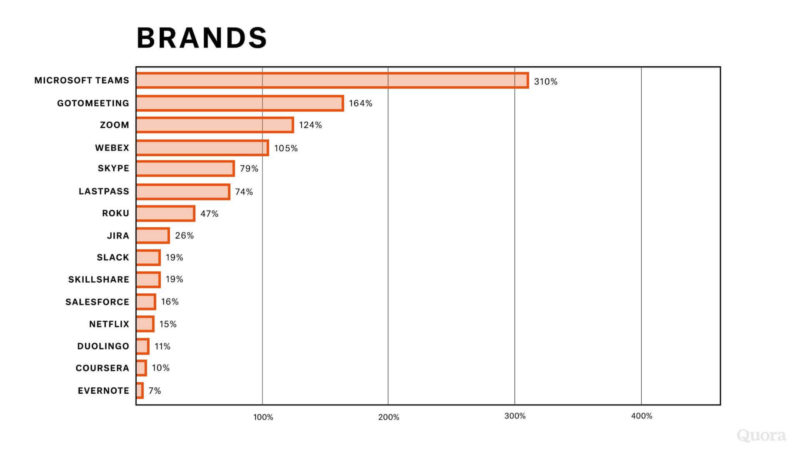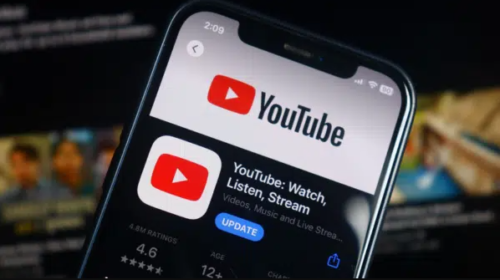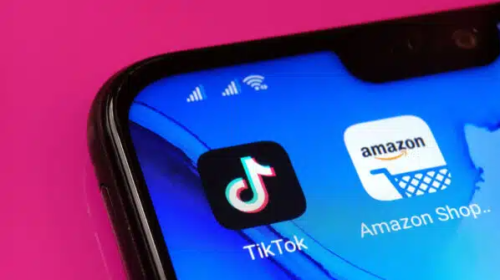Social Shorts: Creative highlights, Quora queries, Twitter ad data, Facebook’s newest app
The social media marketing week in review: A round up of news and announcements you may have missed.
The social media marketing week in review: A round up of news and announcements you may have missed.

(Beyond social) creative moments that caught our attention
Audi x We Are Social takes viewers on a virtual road trip. With much of the world on lockdown, Audi Australia in partnership with creative agency We Are Social jumped on the opportunity to recreate a scenic drive for those stuck at home. The four-hour, slow TV-style video – shot inside and around an Audi A6 sedan – takes viewers through Australia’s countryside, complete with weather changes throughout the journey. True to the times, director Luke Bouchier employed multiple cameras with four crewmembers in four separate cars to capture the footage, while composer John Hassell scored the track from his own home in France. Source: AdAge
William Grant & Sons opens a virtual bar. Scotch whiskey distillery William Grant & Sons is shaking up its stay-at-home routine by bringing the bar to people at home. The 1887 Virtual Bar (named for the year the family-owned company was founded) will feature weekly guests as hosts and bartenders. The first experience will take place on Zoom this week, and will include Hendrick’s Gin ambassador Charmaine Thio and Glenfiddich’s Brett Bayly as recurring hosts. It’s a refreshing example of how brands like WG&S are finding opportunities to connect with audiences while keeping the brand spirit alive despite restrictions around in-person gatherings. Source: The Drum
IKEA’s instruction manual for staying home. To amplify the public message to stay home during this crisis, the Swedish retailer released its own step-by-step guide for what to do in a pandemic. The guide looks a lot like IKEA’s typical instruction manual – branding and all – only, the words “Stay Home” are displayed above a house. Instead of listing tools to build the pictured house, the manual shows a key, a lock and 100 rolls of toilet paper. Below that, a graphic of a closed door shows a checkmark while an open door shows an “x,” indicating what NOT to do. The instructions were posted on IKEA Israel’s Facebook page and were created in partnership with agency McCann Tel-Aviv Israel. “It’s really not complex – just staying at home,” reads the post. Source: AdAge
Quora users are looking for answers on productivity tools

Quora’s head of marketing, JD Prater, highlighted trends around how users (and brands) are engaging on Quora during this time of crisis. “From productivity tools to self-improvement activities to video conferencing, it’s obvious we’re all doing our best to settle into this new normal,” he noted.
In particular, he outlines the brands that are seeing a trending spike in engagement on the question-and-answer platform. “Several productivity tools are breaking through the noise and earning a lot of attention on Quora. Microsoft Teams rocketed up 310% while their primary competitor Slack was up 19%. No surprise here that popular video conferencing apps GoToMeeting, Zoom, WebEx, and Skype are seeing nice increases in views,” Prater wrote.
Twitter’s bot problem persists, Zoom vows to improve its platform amid surge in usage
Zoom pledges to improve systems, ramp up security. With the global workforce scrambling to WFH, video conferencing platform Zoom is feeling the pressure as usage skyrockets. Zoom has acknowledged the cracks in its system and announced plans to continue improving its platform, protecting user security, and supporting the surge in traffic. In a blog post last week, Zoom wrote, “These new use cases have helped us uncover unforeseen issues with our platform… We appreciate the scrutiny and questions we have been getting – about how the service works, about our infrastructure and capacity, and about our privacy and security policies. These are the questions that will make Zoom better, both as a company and for all its users.” Source: Zoom. Why we care: As marketers, communication is critical – even more so in times like these. Zoom’s commitment to making productivity changes for the better is an improvement that we can all benefit from.
Twitter bots are alive and well – and fueled by politics. Bots and fake accounts have been a long time headache for Twitter users, but the problem doesn’t seem to be getting any better. Fake profiles and bots account for anywhere between 5% to 15% of total users, Social Media Today notes, but their presence has an even bigger impact. Social media analysts have called out swarms of bot accounts being used for malicious purposes, such as amplifying political messages or mass retweeting to drown out opposing views. Source: Social Media Today. Why we care: Despite Twitter working to address the issue through various measures (like bulk removal of fake accounts), the issue is still a red flag for users and brands. As told by Social Media Today, “banning political ads on the platform is one thing, but banning bot swarms would likely have a much bigger positive impact in the case of tweets.”
Facebook’s app for couples, Twitter shares more data with advertisers and TikTok’s latest legal troubles
Facebook has a new app for couples. Earlier this week, the tech giant quietly released a new app for couples called Tuned, developed by Facebook’s New Product Experimentation team. It takes on a messaging app appearance and is designed to help romantic partners communicate via text, voice messages, photos, and songs. Source: The Information. Why we care: The app abides by Facebook’s data policy, which allows user information to be collected for ad targeting purposes.
Twitter is sharing more data with advertisers. Twitter alerted users with a pop-up this week that it’s passing more data to advertisers in order to help prove the effectiveness of ads on its platform. As part of the effort, Twitter removed a privacy setting that users could toggle to prevent Twitter from sharing information (such as ads views and your device ID). For most users, that information will now be shared by default and can’t be turned off. Source: The Verge. Why we care: According to Twitter, this move helps verify that people are actually watching, interacting with, and otherwise seeing the ads that advertisers are paying for, which helps the company “continue operating as a free service.” For advertisers, this means more measurable data which could drive stronger ad performance. Suddenly, advertising on Twitter makes sense.
Publishers threaten to sue TikTok over music licensing issues. TikTok has taken measures to reduce the amount of copyrighted music on its platform, but the Chinese-owned app still has a long way to go. According to the Financial Times, the National Music Publishers Association is threatening legal action against TikTok, and rumor has it that Universal Music Publishing Group is considering doing the same. Source: Financial Times. Why we care: TikTok is still a young platform, and will likely continue to experience legal growing pains – especially with music as a core feature of its platform. Brands on TikTok should keep an eye on the music they use (especially in campaigns). Or, do what e.l.f. cosmetics did – and make your own track.
Facebook rolls out Quiet Mode, Instagram brings DMs to the web
Quiet time on Facebook. Facebook has released a new feature called Quiet Mode last week, which lets users mute all notifications in an attempt to promote downtime away from the screen. It will continue rolling out for iOS users through the next month, and it will be available for Android users starting in May. Source: VentureBeat. Why we care. Quiet Mode complements Facebook’s other efforts to offer relief in the time of COVID-19. It’s coupled with the app’s ‘Your Time’ feature as part of Facebook’s well-being suite that launched back in 2018. The ability to mute all notifications signals a broader push to address growing concerns about the impact of technology on mental health – especially during a time of crisis.
Instagram now shows DMs on desktop. As a long-awaited feature sought after by businesses, creators, and users alike, Instagram is finally bringing direct messages to its desktop browser site. Instagram announced the move on Friday, stating that users globally will now be able to access DMs on the web. Source: The Verge. Why we care: Desktop DMs have been in beta since January, and the platform has gradually added small features to mirror the DM experience users are already familiar with on the app. For marketers in particular, the ability to access DMs directly from the computer means one less step when connecting with audiences or customers.




